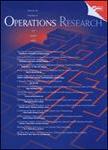-
作者:Jasin, Stefanus
作者单位:University of Michigan System; University of Michigan
摘要:We consider a standard dynamic pricing problem with finite inventories, finite selling horizon, and stochastic demands, where the objective of the seller is to maximize total expected revenue. We introduce a simple improvement of the popular static price control known in the literature. The proposed heuristic only requires a single optimization at the beginning of the selling horizon and does not require any reoptimization at all. This provides an advantage over the potentially heavy computati...
-
作者:Afeche, Philipp; Diamant, Adam; Milner, Joseph
作者单位:University of Toronto
摘要:We study a double-sided queue with batch arrivals and abandonment. There are two types of customers, patient ones who queue but may later abandon, and impatient ones who depart immediately if their order is not filled. The system matches units from opposite sides of the queue based on a first-come first-served policy. The model is particularly applicable to a class of alternative trading systems called crossing networks that are increasingly important in the operation of modern financial marke...
-
作者:Bijvank, Marco; Huh, Woonghee Tim; Janakiraman, Ganesh; Kang, Wanmo
作者单位:University of Calgary; University of British Columbia; University of Texas System; University of Texas Dallas; Korea Advanced Institute of Science & Technology (KAIST)
摘要:We study an inventory system under periodic review when excess demand is lost. It is known (Huh et al. 2009) that the best base-stock policy is asymptotically optimal as the lost-sales penalty cost parameter grows. We now show that this result is robust in the following sense: Consider the base-stock level which is optimal in a backordering system (with a per-unit-per-period backordering cost) in which the backorder cost parameter is a function of the lost-sales parameter in the original syste...
-
作者:Keskin, N. Bora; Zeevi, Assaf
作者单位:University of Chicago; Columbia University
摘要:We consider a monopolist who sells a set of products over a time horizon of T periods. The seller initially does not know the parameters of the products' linear demand curve, but can estimate them based on demand observations. We first assume that the seller knows nothing about the parameters of the demand curve, and then consider the case where the seller knows the expected demand under an incumbent price. It is shown that the smallest achievable revenue loss in T periods, relative to a clair...

